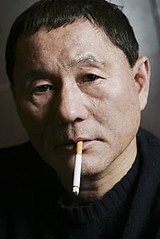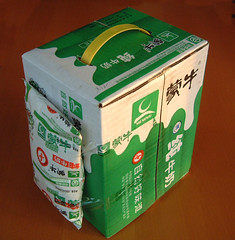21
Apr 2006Visual Learners in China
I am a visual learner. I want to see new words written down. I like to see concepts diagrammed. I understand more easily and remember much better that which I see.
So far, this seems like a handicap for me at ECNU. With only one exception, none of my classes this academic year have made much use of visual aids. (And when I say “visual aid,” I use such a loose definition as to include just writing anything on the board.) This semester has been especially bad in this respect, with three classes where the professor typically just sits there and talks the entire time, never going near the board. This wouldn’t be so bad if the professor were lecturing on some sort of material we had already read about beforehand, but for those classes the material all comes straight from the professor (although there are some recommended texts). So most of the time, class content is 100% aural.
The one class where the teacher consistently uses the blackboard is an undergrad class on Modern Chinese I am auditing to get extra credits. That class is so hugely different from my graduate courses it’s almost laughable, but it should be easier–it’s a core undergrad course. We have one set text, and the teacher goes straight through it. Much of what the teacher writes on the board is in the book anyway. When the teacher writes on the board, he writes in extremely neat, clear handwriting. (One of my professors has handwriting so bad it gives me nightmares.) Is this undergraduate class representative?
It’s my first time in graduate school anywhere, so in all honesty I’m not sure exactly what to expect. As a graduate student, I don’t expect content to be spoon-fed to me as if I were still an undergrad. It just seems like there should be some visual content in my graduate classes. I’ve heard rumors of PowerPoint, but have never seen it in any of my classes.
So all this leads me to wonder… are visual aids just for babies undergrads (in China)? Does China’s system of higher education possibly favor those who are not visual learners?
Never having been a graduate student anywhere else or an undergraduate student in China, these are questions I cannot answer on my own.
19
Apr 2006谢老师的问题
谢老师在研究如何利用Blog, Wiki, Podcasting来学习中文。以下是他的问题和我的回答。
-
你是如何想到利用博客练习中文?你在上海华东师范有很多练习的机会,为什么还要利用博客?
我2002年开始写英文blog,认识了许多写博客的朋友。其中有一位刚刚开始写英文博客的中国女孩,网名叫Leylop。可能是她启发我了。虽然在生活中我认识不少的中国朋友,但是跟他们交流并不能代替写博客的经历。首先博客是写的。我写得比较非正式,但是话语和文字本来就有很大的区别。写文章我可以慢慢找最恰当的词汇,(够耐心的话)可以改改所有的错误,可以不怕说错、不怕别人插嘴。其次写博客的观众基本上是无限的,跟平时说话有很大的不同。通过博客我可以看到各界的意见,不限于我的交际圈子。再次博客不受日常生活时间限制。我和朋友都较忙的时候,也许有几个星期不见面。但是博客随时都可以写,凌晨2点也可以,所以主要的问题不是时间而是灵感。
-
你的网站公布以后,你是否有时间来阅读别人的回复?从这些回复中你能学到什么?
每一次有人留言我都会看。我承认在留言当中我跟访客交流得不是特别多。这是因为我看新的留言的时候不一定有时间写回复。有时候也会忘记。但是我还是非常感谢留言的访客。有时候我也会直接问读者一些汉语方面的问题,比如“莫名其妙的广告”、“第三声:两个问题”、“大鱼,小池”。他们的回答总是很有帮助。
-
在你看来,博客是不是一个很好的语言学习工具?
博客肯定是个很好的语言学习工具!不是的话我早就会放弃她。唯一的缺点是应该经常写新的文章,要不然读者会“跑掉”。有时候觉得想中文博客的话题真是个挑战。
19
Apr 2006Satellite TV for Beer
Do you live in Shanghai? Do you want satellite TV? Well, here’s your chance to get a satellite dish with the box. All you have to do is come over and pick it up. But you have to leave beer.
The satellite dish and box once belonged to a co-worker of my roommate Lenny. The guy left Shanghai, and left his working satellite dish and box with Lenny. The thing is, neither Lenny nor I watch much TV, so neither of us is interested in installing it or dealing with the descrambling card hassle.
But if you like satellite TV and you have some beer to donate, this is your lucky day.
Here’s the deal: e-mail me before Friday night telling me the type and quantity of beer you want to offer us for the satellite dish (please don’t let it be Bud), along with your contact info. Whoever makes us the best offer gets to come and pick it up on Saturday.
Sorry, no pic… but I won’t demand a picture of the beer either.
18
Apr 2006April Chinese Links
The links have been piling up lately, and I thought I’d share a few related to China and studying Chinese.
1. Slate seems to think ChinesePod is pretty damn cool: Learning to Flirt in Chinese. Slate doesn’t really mention anything academic, but I’m working on that.
2. ChinesePod is not the only Chinese podcast game in town… there’s also Mandarin Chinese with Serge Melnyk. You compare.
3. A list of “Core Simplified Characters.” Great reference for anyone who’s trying to learn traditional after learning simplified or vice versa.
4. You’ve probably seen Pīnyīn.info, but have you seen the blog Pīnyīn News? Good stuff.
5. Sinosplice commenter Annie has also put together a 4 Part Pinyin Tutorial. Each part has an instructional MP3, a text in PDF format, and a drill MP3. Also check out Pinyin Practice, which offers lots of online drills.
6. The Ohio5 ViewPoints Series will give beginners practice listening to Chinese through Quicktime video clips. Actually seeing the various speakers’ faces as they talk helps.
7. Condensed China: Chinese History for Beginners. China does really need to cut down on its history.
8. The most common Chinese characters in order of frequency. More than just a list, it actually gives character readings, meanings, and examples.
9. Just in case you ever need a list of 10-500 random Chinese names in traditional characters, there’s the Chinese Name Generator. Oh, but they all have three characters, and it won’t tell you how to pronounce them or what they mean. I can’t think of any possible use for this thing (except for maybe adding fake Chinese names to the credits of your homemade kung fu movie?), but there it is. (Also, don’t miss the pseudonym generator or the lucky company name generator.)
10. The zdt (Zhongwen Development Tool) is an easy to use, open-source Mandarin Chinese flashcard application. Supports simplified and traditional characters, lets you add characters as you browse, and has optional Adso database support (120,000 entries).
Many of these links were found through del.icio.us: http://del.icio.us/tag/mandarin.
16
Apr 2006Happy Easter!
祝大家复活节快乐! (I wish you all a happy Easter!)
(Image found on Japancast.)
P.S. And a very happy birthday to a very special someone…
P.P.S. I don’t believe in any “war on Easter,” but as a Catholic I do believe that Easter is about the resurrection of Jesus and not chocolate bunnies. Still, I find this kind of thing funny.
14
Apr 2006My Ayi on Politics
The other day as Xiao Wang (my ayi, a 32-year-old woman from the Harbin area) arrived, I was watching the news. Wen Jiabao (温家宝) was making some statement or other. Xiao Wang didn’t pay any attention. She started fixing dinner.
It suddenly occurred to me to get Xiao Wang’s take on Chinese politics, so I asked her what she thought of Hu Jintao (胡锦涛). I think it confused her a little, because Wen Jiabao was on TV, and I was talking about Hu Jintao. But her response was, “I don’t watch the news much.”
Not satisfied with that, I pressed her: “but don’t you have some opinion about the government?”
Looking up at the TV, which now showed a People’s Congress session in Beijing, she replied, “look at them… they’re all a bunch of Southerners.”
Thus ended the conversation on politics.
13
Apr 2006腾不出时间
T·富勒曾经说过:
> 那些最能充分利用时间的人根本腾不出多余的时间。
看来我就是那种“最能充分利用时间的人”因为我连写好中文blog的时间都没有!
我没有放弃我的中文blog……
13
Apr 2006Wanted: Good Chinese Podcasts
I’d like to find some good Chinese podcasts. I don’t mean podcasts for studying Chinese, I mean podcasts in Chinese, intended for a Chinese audience. Interesting podcasts. The only problem is I don’t have a lot of time to search and then listen to all those podcasts. So I asked around a bit.
As it turns out, CSL blogger extraordinaire Alaric listens to a few Chinese podcasts. These are the ones he listens to:
– 有一说二 (Roddy also likes this one)
– 反波 (Antiwave)
– Princess Remy
As was pointed out on Chinese Forums as well, Alaric mentioned that the 2005 Chinese Podcast Awards Results are a good place to start looking.
Any other recommendations? Anyone?
11
Apr 2006Who Wants to be a Patriotic Millionaire?
I have this bad habit of randomly sampling Chinese Flash animations and games from time to time. Recently I found this trivia game called 百萬富翁遊戲:愛國版 (Millionaire Game: Patriot Edition). It’s got trivia questions mainly relating to the Opium War and Republican China. I have never been a very good student of history, so between my ignorance and the annoying traditional characters it took me a few tries to win the game. But now I feel confident enough to take on those Hong Kong primary schoolers!
The game kind of made me wonder about Hong Kong’s version of Chinese history. Both the PRC and RoC have ridiculously stilted versions of history. How is Hong Kong’s? Did it change a lot after 1997? I really have so little contact with Hong Kong.
09
Apr 2006The Best Chinese Textbooks
So now that I’m working on the academic side of ChinesePod one of the first things I want to do is start expanding the Chinese pedagogy resource library. There are all kinds of great resources out there, but what I want to focus on first is the more complete sets intended for formal education. I want to collect the best Chinese textbooks.
When I first began studying Chinese at University of Florida in 1998, we used a series by Yale the first year (I’m not sure which textbook it was, exactly). I don’t remember being overly impressed with it. The second year the Chinese program switched over to Integrated Chinese, which I liked a lot better. Unfortunately, I only had room in my schedule for one semester of second year Chinese. After arriving in China, I was even more impressed with Integrated Chinese because I discovered that everything in the textbook was immediately useful. That is really saying a lot. [See also my full review of Integrated Chinese (Level 2).]
My only other formal Chinese instruction happened in 2003, when I attended “advanced” (upper intermediate, really) classes at Zhejiang University of Technology for one semester in preparation for the HSK. The textbooks I used for that were pretty forgettable.
Bottom line: I haven’t had very much experience with Chinese textbooks, but now I need to know which ones are good. I mean the ones that start from the beginning and go all the way through to intermediate or advanced level.
I stopped by Chinese Forums, which is always a good place to start for academic Chinese questions. People there seemed to like Chinese Made Easier (Shaanxi Normal University Press) and New Practical Chinese Reader (Beijing Language & Culture University Press). A Chinese Forums member named kudra even posted a list of 25 texts used in American universities’ Chinese programs. Seriously useful stuff.
Still, I would really like to hear from my readers. I know that many of you have far more experience formally studying Chinese than I do. Which Chinese textbooks are the best?
07
Apr 2006Toenail Terror in the Foot Bath
OK, we all know how we are supposed to trim our toenails, right? Always straight across. eHow says:
> Cut toenails straight across and avoid cutting them too short; otherwise, you might get ingrown toenails (a condition in which edges of toenails push into the skin).
Just to make this absolutely clear, let me provide a visual aid:
| Right | Wrong |
Recently I went on a trip to Wuyuan with some other ECNU students, and I went to our hotel’s foot bath with a friend. At one point during the soaking/greasing/kneading process they asked if I wanted my toenails trimmed. I said sure. Why not?
It wasn’t until a few days later that I even noticed how they trimmed my big toenails:
| Before | After |
I sure hope I don’t get ingrown toenails because of how those clowns trimbed my toenails! So if you ever get a foot bath in China, watch out.
[Incidentally, another thing I should warn you about is pictures of toenails. I used Google Image Search to search for toenails (and other variations), and I got quite a few eyefuls of some naaaasty stuff. Interestingly, when you search for toenails in Chinese on Baidu (脚趾甲), you get only pretty toenails, interspersed with hot chicks, puppies, sunsets, pandas, cherries, and other happy images. If this is the CCP’s vision of a cleaner internet, I think I like it. Anyway, that’s why I had to draw my own toenail images.]06
Apr 2006Bulk pricing at last?
It seems hard to believe, but bulk pricing is hard to find in China. When I had only been in China for about a year, I would typically have conversations like this with supermarket clerks:
> Me: How much for one?
> Clerk: 5 rmb.
> Me: OK, how about if I buy this 6-pack?
> Clerk: (looking at me like I’m a little slow) 30 rmb.
> Me: OK, then this whole case of 24?
> Clerk: (wondering what’s wrong with me) 120 rmb. Like I said, 5 rmb each!
Coming from such a hugely capitalist nation, it confuses me when I’m not constantly being goaded into consuming more, more, more. But finally I got it: China just doesn’t do bulk pricing in supermarkets.
Until recently! I saw this box of 蒙牛 (lit. “Mongolian Cow”) milk packets at the grocery store, and they were doing a special promotion: you buy the box of 8, and you get the one taped to the outside for free. Soon thereafter I began seeing this “buy 8 get 1 free” strategy everywhere (but only for milk).
But speaking of Mengniu, have you had this stuff? It is so good! I’m a milk drinker, so I can’t believe I lived in China so long before trying it. It’s so thick it puts American “whole milk” to shame. And then Mengniu chocolate milk… well, don’t even get me started. If you live in China and you drink 光明 (Bright), you’re totally missing out. (If you don’t want all that delicious milk fat, I guess maybe you want to be missing out, though…)
05
Apr 2006Like Syntax from Takeshi

Kitano Takeshi
This is a picture of Kitano Takeshi (北野武), AKA “Beat Takeshi.” (I always find his Chinese name, Běiyě Wǔ, surreally different from his Japanese name.) My syntax teacher looks a lot like this guy, except for having smile lines around his eyes instead of Takeshi’s perpetual mask of indifference. They seem to share a love of the cigarette.
So sometimes when I’m listening to a lecture on Chinese syntax, my teacher’s visage sends my mind back to a scene in Hanabi, or images of a gangster hanging out with a little boy in Kikujiro. Except instead of spitting out tough guy talk, he’s outlining how the latest cognitive linguistics research affects our understanding of phrase structure. Then he cracks one of his bizarre jokes, and those smile lines seize his face once again, shattering the illusion completely.
I like my teacher, but I’m really not so into Chinese syntax theory. Somehow, though, Takeshi’s Chinese doppelganger helps get me through those classes.
03
Apr 2006ChinesePod and me
ChinesePod has been generating buzz online for some time among those of us who are interested in new methods of studying Mandarin Chinese, and yet you haven’t heard a peep out of me about it (OK, maybe one peep). There’s a reason, so let me explain.
When I first discovered ChinesePod months ago, I thought, “that’s kinda cool, but a podcast a day? Let’s see how long they can keep that up.” Well, they did keep it up, and the buzz grew.
Then I got an offer to join the ChinesePod affiliate program (a form of advertising that pays only when people sign up). I was interested, but I also didn’t want to throw my support behind ChinesePod just yet. I already had Google ads in my archives, but because those are targeted to content, you’re not actually endorsing any particular product. With ChinesePod it would be different, so I wanted to be sure I really liked the product. I wasn’t personally interested in the content because the intermediate lessons were too easy and there were no advanced lessons then. I was a little too busy to check out the service at that point.
Well, at about the time ChinesePod started producing advanced lessons, they also contacted me and asked if I would be interested in working with them. It sounded like a cool opportunity, so I met up with ChinesePod for a chat. I was quickly sold.
The product as it stands now naturally has its shortcomings, but the team is well aware and is working hard to improve it. Virtually all my initial criticisms of the site are already being dealt with, and in fresh, innovative ways. Furthermore, the company is so open to criticism and feedback it’s scary. It even cares about theoretical linguistic foundations. I know I sound like a cheesey commercial, but the ChinesePod team and plan just impressed me that much.
Anyway, now that I have joined the ChinesePod team and will play a part in influencing its development, there’s no reason why I wouldn’t fully support it. It’s good stuff, and rapidly getting better.
So, yeah. ChinesePod and me.
02
Apr 2006Chinese Number Tool
A little while back I recommended that Mark of the blog Doubting to shuō make an online number conversion tool similar to his Pinyin Tone Tool and Cantonese Tone Tool. Well, Mark has done it. These are the kinds of conversions it can do:
| Input | Output |
| 五千八百 | 5800 |
| 兩百五十 | 250 |
| 三百萬 | 3000000 |
| 三百万 | 3000000 |
| 7十 | 70 |
| 九億 | 900000000 |
| 九亿 | 900000000 |
| 6.25亿 | 625000000 |
| 1500万 | 15000000 |
| 五億三千九百二十萬四千四百四十一 | 539204441 |
| 壹仟叄佰柒拾捌 | 1378 |
Note that the Chinese Number Tool handles simplified, traditional, and even 大写. The tool can also optionally insert commas in the output. See Mark’s blog entry about it for further explanation. Nicely done, Mark!
31
Mar 2006Japanese Issues in Wuyuan
The group of ECNU international students that went to Wuyuan last weekend was composed of undergrads and above (no language students). So that meant everyone could communicate in Chinese pretty well already. There was a whole busload of Korean students and half a bus of Japanese students, however, so you still heard a lot of Korean and Japanese on the trip.
It was nice hearing Japanese again (it’s been a while), and even nicer knowing I still understand it pretty easily. What was not so nice was discovering that when I speak it now, it requires much more effort than it used to.
I was talking about that with a new friend from Sri Lanka. He noticed I wasn’t talking to the Japanese students a whole lot and asked me why I didn’t make friends with them and practice more Japanese. I explained to him that after living in China for over 5 years, I have become extremely sensitive to the practice of using people for language practice. I refuse to use Japanese people for Japanese practice.
It’s sad, because thinking about it, I realize that I’m less friendly to those Japanese students because I don’t want to use them. I unintentionally pass up chances for friendship because of my strong aversion to the idea of “using” them.
[The antagonistic may now ask, “well why do you think it’s fine to use the Chinese but not the Japanese?” I’m going to pretty much ignore this question because I can see nothing wrong with sincerely engaging people in their native tongue in their own country, and never will.]Obviously, the solution is to “lighten up” and just “be natural.” Why is that so hard? I honestly feel slightly socially scarred on this issue. I am trying to do something about it, though. I warmed up to some of the Japanese students by the end of the trip.
29
Mar 2006Mandarin Tone Changes
I recently got an e-mail from a beginner regarding tones in Mandarin:
> I was searching the web to find an answer with no luck. I read what you wrote about Debating “You’re Welcome” and I’m hoping you can help me.
> I keep finding different sources giving different tones for “bu keqi”. In Chinese for Dummies bu has a rising tone and keqi both have falling syllables. Another book gave a falling tone to bu, a flat tone to ke, and a rising tone to qi. Many websites tell me that I have the right words, but they don’t give the tones at all.
> If you have an extra minute, I’d also love to know the tones on the variants you wrote, or a good source to look them up at.
I realized that the author of the e-mail was confused because there is a rule in Mandarin Chinese that when when 不 precedes a 4th tone, it becomes second tone. Most textbooks will expect you to always remember this after they teach it, and will still mark 不 as 4th tone even though it should be read as 2nd tone. Some textbooks, however, mark 不 as 2nd tone when it should be read as 2nd tone. I can see how that could be very confusing to a new learner.
In responding, I wanted to include a link to a site which clearly outlined all the tones changes (AKA tone sandhi) that occur in Mandarin. I was disappointed that Wikipedia didn’t seem to have one. Eventually I found the rules outlined clearly in the Change of Tone section of a site called InstantSpeak Chinese.
I had never explicity learned Rule 3, regarding the “half third tone,” but when I thought about it, I realized it was true and that I even follow it. I guess I unconsciously acquired it.
Anyway, because I found them somewhat hard to find online, I’m going to reproduce the main tone rules here (leaving out the “half third tone” one) and add some examples to flesh them out a bit.
Mandarin Tone Sandhi
1. When there are two 3rd tones in a row, the first one becomes 2nd tone. Examples: 你好 (nǐ + hǎo = ní hǎo), 很好 (hěn + hǎo = hén hǎo), 好懂 (hǎo + dǒng = háo dǒng).
2. 不 is 4th tone except when followed by another 4th tone, when it becomes second tone. Examples: 不对 (bù + duì = bú duì), 不去 (bù + qù = bú qù), 不错 (bù + cuò = bú cuò).
3. 一 is 1st tone when alone, 2nd tone when followed by a 4th tone, and 4th tone when followed by any other tone. Examples: 一个 (yī + gè = yí gè), 一次 (yī + cì = yí cì), 一半 (yī + bàn = yí bàn), 一般 (yī + bān = yì bān), 一毛 (yī + máo = yì máo), 一会儿 (yī + huǐr = yì huǐr).
Again, it’s important for beginners to memorize these rules because textbooks will often not remind you. They usually provide words’ original tones before tone sandhi.
Related: my Chinese blog entry about lots of third tones strung together
27
Mar 2006Making Money on Roadkill
So in Jiangxi on the way back from Wuyuan our bus got stopped for 30-40 minutes at a toll booth. It turned out that a ways back our driver had hit a dog. He knew he had, but the dog had come out of nowhere, and it definitely didn’t make it. We kept going. The owner saw the bus hit his dog and took off after our bus on his motorbike. He caught up to us at the toll booth.
The owner demanded 500 rmb as compensation for the dog. Now, I love dogs, and my sympathies are with the owner, but 500 rmb is an outrageous amount. The dogs in the countryside are all mongrels that just roam around.
The owner’s motivations were clear. We wondered if he was even the owner. He might have just been a guy that saw the dog get hit. None of the dogs we saw in Jiangxi wore collars or anything. Some of my classmates were joking that maybe he raises dogs just to chuck them in front of out-of-town tourist buses.
The taxi driver and the dog owner argued for quite some time while we all sat in the bus. Eventually police came to mediate. In the end the driver had to pay 300 rmb.
I felt a little bad about assuming the guy was merely a blatant opportunist. Maybe the dog actually did mean a lot to him. But then as we pulled away I got a look at him. He had quite a grin on his face.
24
Mar 2006Field Tripping for Vengeance
Back in my first year or two of teaching at ZUCC, there were several instances where I showed up to the classroom all prepared to teach “Spoken English” (invariably they were early morning classes), only to be stood up by the entire class. No one came. Why? It was their 春游–their yearly “Spring Outing.” The “class monitor” (班长) had neglected to inform me.
What are these “Spring Outings?” They’re a very Chinese way of enjoying life’s splendid reemergence in nature. They’re an opportunity for students to bond and further develop comraderie. They’re a means for Chinese citizens to rediscover the natural beauty of their motherland. But most importantly, they are a “get out of class free” card.
You see, when a Spring Outing comes up, all you have to do is tell the teacher “we have a Spring Outing,” and class is automatically canceled, no questions asked. Matters of curriculum are petty in comparison to this wondrous rite of Spring.
Well, this year, I finally get my turn. The international center of East China Normal University has arranged a Spring Outing for its foreign students: a three-day trip to Wuyuan (婺源), Jiangxi Province. It only costs 50 rmb per student–bus fare, hotel, and basic food included! I leave today at 7am and get back late Sunday. It might be an overly touristy experience, but at least I’ll get some time to meet some more people. Plus I haven’t gone on a trip in a while, and I’m overdue. I’ll probably pick up some tea for my girlfriend’s parents (I hear they like that). Anyway, all that is only secondary, because this time I’m getting out of class and going on a Spring Outing as payback. This time I’m… field tripping for vengeance!
22
Mar 2006China Video Podcasts
Recently ChinesePod released its first video podcast: a visit to Shanghai’s Xiangyang Market (襄阳市场). The video is pretty entertaining and well done, and gives you an idea of how items are haggled over in a Chinese market.
The ChinesePod Weblog has some interesting topics, ranging from issues in applied linguistics such as the ‘lexical approach‘ to Chinese ‘buzzwords‘ (didn’t Micah used to have buzzwords too? What happened to those?).
The other video podcasts I discovered recently are by Ron Sims, a guy from Cleveland currently living in Fuzhou, China. His podcast series is up to three official episodes, and they’re not bad. So far there’s “the haircut” (can Chinese barbers cut black hair?), “street food” (he even eats stinky tofu on camera!), and the “breakdance show” (Ron was not impressed). Ron speaks Chinese, but the podcasts are mostly in English. I think he does a good job of providing a glimpse into life in China.
Ron’s videos are MP4s, so you may need either iTunes (which I hate) or a recent version of Quicktime to play them.





